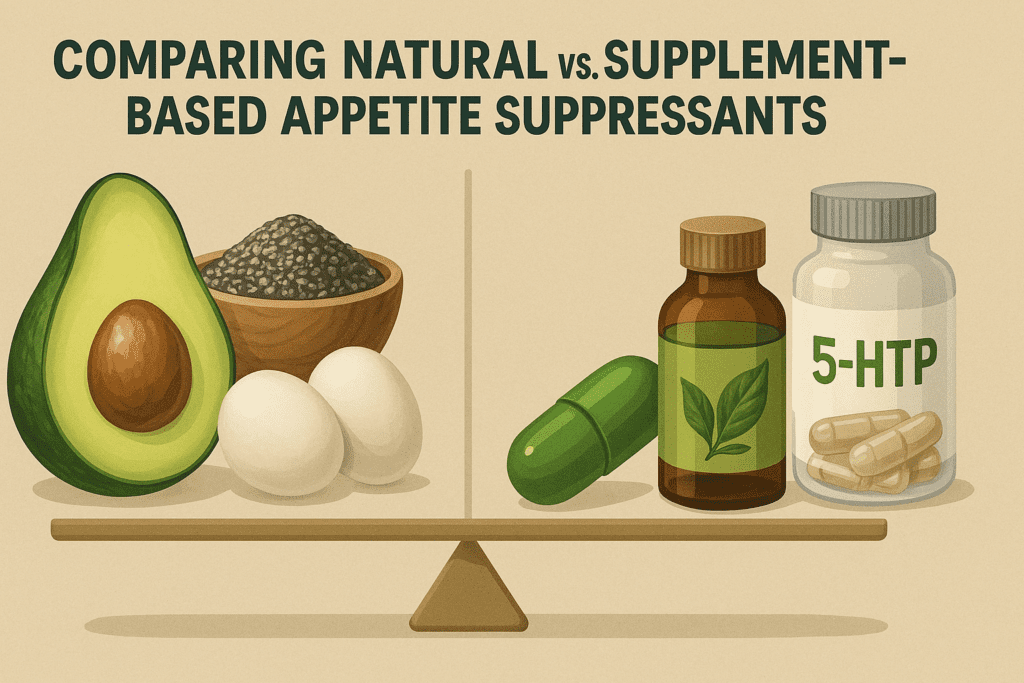In a world where convenient, calorie-dense foods are available at every corner, learning to manage hunger and reduce overeating is essential to supporting long-term health and sustainable weight management. For many people, the question isn’t just how to lose weight—it’s what can I do to suppress my appetite and reduce unnecessary cravings while still nourishing the body. Appetite suppressant strategies, both natural and supplement-based, have gained attention as tools that can help regulate hunger and support a healthier lifestyle without relying on extreme diets or deprivation.
Appetite control is influenced by a complex interaction of hormones, brain signals, food choices, and emotional factors. Natural appetite suppressant techniques and products can offer practical ways to manage these influences, but understanding how and why they work is key. Whether you’re interested in a natural hunger suppressant like high-fiber foods, or curious about the best appetite suppressant available over the counter, the goal is the same: find methods that align with both your body’s needs and your health goals. This article explores the science of hunger, evaluates proven strategies, and outlines what to take for weight loss in a way that’s effective, evidence-based, and sustainable.
You may also like: Why Am I Craving Sweets All of a Sudden? Expert-Backed Reasons and How to Stop Sugar Cravings Naturally

How Hunger Works: The Science Behind Appetite and Fullness
Before exploring which appetite suppressant options may be right for you, it’s important to understand what drives hunger in the first place. Appetite is regulated by several hormones, most notably ghrelin, which stimulates hunger, and leptin, which signals fullness. These hormones interact with the brain—specifically the hypothalamus—to regulate when you feel hungry and when you feel satisfied. However, modern eating habits, stress, and processed foods can disrupt these natural cues, leading to chronic hunger, emotional eating, and cravings that don’t reflect real nutritional needs.
A well-balanced diet, structured meal times, and intentional eating practices help support this natural system. When hunger hormones are working properly, your body sends reliable signals to indicate when to eat and when to stop. However, when these cues are thrown off by irregular meals, sleep deprivation, or high-sugar diets, even the best intentions may not be enough to maintain healthy eating patterns. This is why many people search for the best appetite suppressant to support their body’s natural mechanisms—especially during periods of weight loss or metabolic transition.

Natural Appetite Suppressant Foods That Promote Fullness
For those looking to answer the question, what can I take to reduce my appetite naturally, the solution often begins in the kitchen. Certain foods have natural hunger suppressant qualities that help reduce cravings and promote feelings of fullness. These include high-fiber vegetables, whole grains, legumes, and healthy fats—all of which slow digestion and enhance satiety.
Soluble fiber, found in foods like oats, chia seeds, lentils, and flaxseeds, expands in the stomach, creating a sense of fullness that can last for hours. This helps to minimize the urge to snack between meals and supports blood sugar regulation, which is key for appetite control. Plant-based protein sources such as tofu, tempeh, quinoa, and beans not only keep you full longer but also trigger the release of hormones that signal satiety to the brain.
Healthy fats from avocados, nuts, seeds, and olive oil also serve as a natural appetite suppressant by slowing gastric emptying and helping stabilize energy levels. These types of foods not only support weight loss but also provide long-term health benefits. When asking what is a good appetite suppressant that doesn’t involve pills, these foods offer a powerful starting point for appetite regulation.

Mindful Eating as a Powerful Hunger Suppressant Strategy
Beyond food itself, behavior plays a crucial role in appetite control. Mindful eating is a technique that encourages individuals to slow down, pay attention to their hunger cues, and savor each bite. This simple shift in awareness can significantly reduce the tendency to overeat. Many people asking how can I suppress my appetite overlook behavioral approaches, yet studies show that mindfulness practices are among the most effective tools for sustainable appetite control.
Practicing mindful eating means removing distractions during meals, chewing thoroughly, and assessing your hunger and fullness levels before, during, and after eating. This approach helps reduce emotional and stress-driven eating, which often leads to unnecessary calorie intake. In fact, people who eat mindfully tend to consume fewer calories overall while experiencing greater satisfaction from their meals.
Sleep quality also plays a pivotal role. Poor sleep disrupts hormones like ghrelin and leptin, making you feel hungrier the next day. Staying hydrated, reducing caffeine intake later in the day, and following a consistent sleep schedule are all lifestyle behaviors that help regulate appetite naturally. For those who want to know what can I take to curb my appetite without relying on pills, mindful habits offer long-term, side-effect-free solutions.

Evaluating Appetite Suppressant Pills: Do They Really Work?
Appetite suppressant pills are often marketed as quick fixes for weight loss, but do appetite suppressants work as effectively as claimed? The answer depends on the formulation and individual usage. Some appetite suppressant over the counter options can help reduce hunger in the short term, especially when combined with a healthy lifestyle. However, not all pills are created equal, and results vary based on the ingredients and how they interact with the body.
Common ingredients in hunger suppressant pills include caffeine, green tea extract, glucomannan, and 5-HTP. Caffeine can reduce appetite temporarily while increasing energy expenditure, while fiber supplements like glucomannan expand in the stomach to promote satiety. 5-HTP, a serotonin precursor, may help reduce emotional eating. However, not everyone responds the same way to these compounds, and the benefits are usually modest without accompanying lifestyle changes.
The best over the counter weight loss pills tend to have transparent ingredient labels, third-party testing, and moderate dosing. Still, even the best appetite reducer should never be viewed as a substitute for nutritious food and regular physical activity. Appetite suppressant otc products can provide temporary support, but sustainable appetite control requires deeper lifestyle alignment.

What Is the Best Diet Pill to Lose Weight? Insights from Research
The search for what is the best weight loss pill or what is the best diet pill to lose weight continues to dominate conversations around wellness and body image. However, it’s essential to separate hype from evidence. While some prescription options like phentermine or semaglutide have shown effectiveness in appetite suppression, they are designed for individuals with specific medical needs and must be used under medical supervision.
Over the counter options are more accessible, but their effectiveness varies significantly. For instance, some products marketed as appetite killer pills promise unrealistic results with little to no scientific backing. Consumers should be cautious of any pill that claims to “melt fat” or eliminate appetite entirely. The best appetite suppressant for women or men will be the one that supports health goals without causing side effects or disrupting the body’s natural balance.
Some evidence supports supplements like saffron extract, which may help reduce snacking behavior, or chromium, which may aid in blood sugar control. But again, these supplements are not magic bullets. Anyone seeking what to take for weight loss must understand that long-term success comes from addressing the root causes of overeating and building a lifestyle that supports appetite regulation.

The Pros and Cons of Using Hunger Suppressant Pills
For individuals who struggle with intense cravings, hunger suppressant pills may seem like a necessary aid. However, while they can offer temporary relief, they are not a cure for chronic overeating or poor dietary habits. In many cases, the best hunger suppressant isn’t a pill at all—it’s a strategic combination of food choices, behavioral tools, and nutrient timing.
Still, when used responsibly and with guidance, appetite suppressant pills may serve as part of a broader plan. Some people may benefit from temporary use of appetite suppressant over the counter products to reduce cravings while transitioning to a healthier way of eating. Others may find that the side effects, such as jitteriness or digestive issues, outweigh the benefits. This is why evaluating what is a good diet pill to lose weight requires a personal and medically informed approach.
Those considering hunger suppressant pills should look for products without hidden stimulants or proprietary blends. Always consult with a healthcare provider before starting any supplement, especially if you have underlying medical conditions or take other medications. Even the best over the counter weight loss pills are most effective when paired with holistic strategies that address diet, movement, and stress.

What Can I Take to Suppress My Appetite and Stay Healthy?
For anyone wondering what can I take to suppress my appetite safely, the most reliable solutions are those that respect the body’s natural signals and rhythms. Natural appetite suppressant choices like whole plant foods, stress-reducing practices, hydration, and quality sleep are foundational. Supplements can provide short-term support, but their effectiveness is often contingent on the health of the underlying lifestyle.
Herbal options like green tea, ginger, or peppermint tea may gently suppress appetite while supporting digestion. Protein shakes made from plant-based sources offer a convenient way to feel full, especially between meals or post-workout. Adaptogens like ashwagandha or rhodiola may also indirectly support appetite control by balancing stress hormones.
Whether you’re trying to determine what is a good appetite suppressant or wondering what can I take to curb my appetite in a pinch, it’s essential to prioritize long-term sustainability over quick results. The goal isn’t just to suppress appetite—it’s to develop a way of living that doesn’t provoke constant hunger in the first place.
Frequently Asked Questions: Appetite Suppressant Strategies and Weight Management
1. What are some unexpected signs that your body might be responding well to a natural appetite suppressant?
While reduced hunger is the most obvious indicator, there are more subtle signs that a natural appetite suppressant is working effectively. You might notice increased focus, as frequent hunger-driven distractions decrease. Many people also report more stable mood and energy levels throughout the day, which often correlates with reduced blood sugar spikes and improved hormonal balance. Another promising sign is a shift in food preferences; if you’re naturally gravitating toward more nutrient-dense foods, your body’s appetite regulation mechanisms are likely recalibrating. A natural hunger suppressant doesn’t just blunt cravings—it often supports broader metabolic improvements that can reflect in sleep quality and digestive comfort.
2. How can someone identify the best appetite suppressant for their specific lifestyle and eating habits?
Identifying the best appetite suppressant starts with evaluating your primary triggers for overeating. If emotional stress drives your cravings, adaptogens or supplements that support cortisol balance may be more effective than stimulant-based appetite killer pills. For those who snack due to boredom or habit, structured meal timing with fiber-rich whole foods may serve as a better appetite suppressant than pills. It’s also important to consider dietary preferences: vegetarians might benefit more from plant-based protein supplements, while those following low-carb diets might lean toward appetite suppressant otc options that support ketogenesis. The best hunger suppressant is one that aligns with your daily rhythms, doesn’t interfere with sleep or digestion, and encourages long-term behavior change.
3. Are appetite suppressant pills more effective when taken at a specific time of day?
Yes, timing matters when it comes to hunger suppressant pills. Most appetite suppressant over the counter products are designed to be taken 30 to 60 minutes before meals, particularly breakfast or lunch. This allows the active ingredients to reach peak effectiveness as your body gears up to eat, helping to curb your appetite naturally. Taking appetite suppressant pills later in the day, especially if they contain stimulants like caffeine, may interfere with sleep and lead to hormonal disruptions. Some natural hunger suppressant formulations, such as those made with glucomannan, are best taken with plenty of water to ensure optimal expansion in the stomach, enhancing satiety during key mealtimes.
4. What role does gut health play in appetite regulation, and can probiotics act as a natural appetite suppressant?
Emerging research suggests that gut microbiota play a major role in appetite regulation by influencing hormones like ghrelin and peptide YY. Certain probiotic strains may indirectly serve as a natural appetite suppressant by promoting microbial balance that supports satiety signaling. For example, Lactobacillus gasseri has been linked to reduced abdominal fat and suppressed appetite in some studies. A well-balanced gut can also improve nutrient absorption, which reduces unnecessary hunger driven by nutrient deficiencies. While probiotics aren’t typically marketed as appetite suppressant otc products, incorporating them into your routine could complement other strategies to naturally reduce food intake and support digestive wellness.
5. Do appetite control supplements affect long-term metabolic rate or thyroid function?
This is a crucial question, especially when evaluating the safety of weight loss pills that actually work. Some over the counter weight loss pills contain stimulants that may temporarily increase metabolism but could also put stress on the adrenal and thyroid systems over time. While occasional use of appetite suppressant otc options is unlikely to cause harm in healthy individuals, chronic overuse may contribute to fatigue, hormonal imbalance, or rebound hunger. Natural appetite suppressant choices, such as plant-based protein and adaptogenic herbs, are generally safer for long-term use and less likely to disrupt metabolic function. It’s essential to rotate supplements, avoid dependency, and pair any appetite reducer with nutrient-dense meals and stress management practices.
6. How can women approach appetite suppressant strategies differently from men for better results?
Women often experience appetite fluctuations related to menstrual cycle phases, which can affect the efficacy of hunger suppressant strategies. The best appetite suppressant for women should consider hormonal shifts, especially during the luteal phase when cravings for carbohydrates and comfort foods increase. Natural appetite suppressant options like magnesium, B vitamins, or herbs such as maca and ashwagandha may help regulate mood and cravings during this time. Women may also respond better to appetite control supplements that support serotonin production, as emotional eating tends to be a more common pattern. Unlike appetite killer pills that blunt hunger broadly, targeted supplements and dietary changes can help women stay in tune with their bodies while still supporting appetite regulation.
7. What is a good diet pill to lose weight without risking nutrient deficiencies?
The best over the counter weight loss pills are those that not only suppress appetite but also preserve nutritional balance. Products that include plant-based fiber, green tea extract, or garcinia cambogia are less likely to cause nutrient depletion compared to harsh stimulants or diuretics. When evaluating what is a good diet pill to lose weight, prioritize those that complement, rather than replace, a nutrient-rich diet. Supplementing with a multivitamin or consuming fortified whole foods can further safeguard against deficiencies. Sustainable weight loss isn’t about extreme restriction—it’s about appetite control that supports long-term energy, immunity, and organ function.
8. Can psychological techniques like visualization or behavioral priming enhance appetite suppressant effects?
Absolutely. Visualization techniques can reinforce the effectiveness of any appetite suppressant strategy by aligning mental intention with physical behavior. For example, imagining yourself feeling satisfied and energized after a modest meal can help reduce the desire to overeat. Behavioral priming, such as placing smaller plates on the table or pre-portioning meals, also complements the impact of appetite suppressant pills or natural hunger suppressant foods. These cognitive strategies retrain the brain to expect satisfaction from smaller portions, enhancing the effects of hunger suppressant interventions. When combined with over the counter weight loss pills, these techniques may improve consistency and long-term adherence to a healthy eating plan.
9. Are there appetite suppressant strategies that work better for older adults?
As metabolism slows with age, appetite regulation can become more challenging. However, older adults may be more sensitive to the effects of stimulants, making a natural appetite suppressant a safer choice than synthetic hunger suppressant pills. Fiber-rich meals, protein supplementation, and herbal teas like ginger or peppermint can all serve as gentle, effective appetite reducers. Additionally, older individuals should prioritize appetite suppressant otc products that support joint health, cardiovascular function, and cognition—not just weight control. What can I take to suppress my appetite as I age? Often, the answer lies in nutrient-dense foods and supplements that support total body wellness while naturally reducing the urge to overeat.
10. What future innovations are emerging in the field of appetite suppressant research?
Future appetite suppressant strategies may focus more on personalization through genetic testing, gut microbiome profiling, and real-time metabolic monitoring. Researchers are exploring how personalized probiotics, biofeedback devices, and time-released hunger suppressant pills could adapt to individual patterns. There’s also growing interest in plant-based pharmacological compounds that mimic satiety hormones without triggering side effects common in appetite killer pills. As more is understood about how brain chemistry and gut-brain signaling work, the next generation of appetite suppressant over the counter solutions will likely become more precise and less invasive. For consumers wondering what can I take to curb my appetite in the most cutting-edge way, the answer may soon come from wearable technology or personalized nutrition platforms powered by AI.
Conclusion: Finding Balance with Appetite Control for a Healthier Lifestyle
At the core of every successful health transformation is a simple but powerful principle: balance. Learning how to manage hunger naturally, with the occasional help of safe supplements, empowers individuals to take control of their wellbeing without falling into the trap of fad diets or unsustainable routines. Whether you’re seeking a natural appetite suppressant to support a whole-foods-based lifestyle or evaluating which appetite suppressant otc product might work best for you, the key is alignment with your body’s unique needs and rhythms.
Supplements can play a helpful role when chosen wisely, especially when they support behavior changes already in progress. Hunger suppressant pills and weight loss pills that actually work can aid the process, but they are most effective when paired with high-fiber, protein-rich meals, mindful eating, adequate sleep, and stress reduction. When considering what can I take to suppress my appetite, think beyond quick fixes. Instead, invest in approaches that support lasting change and empower you to eat with intention, awareness, and satisfaction.
By integrating natural hunger suppressant strategies with evidence-based choices, you can create a pathway to healthier living that is not only achievable but also deeply fulfilling.
Was this article helpful? Don’t let it stop with you. Share it right now with someone who needs to see it—whether it’s a friend, a colleague, or your whole network. And if staying ahead on this topic matters to you, subscribe to this publication for the most up-to-date information. You’ll get the latest insights delivered straight to you—no searching, no missing out.
Further Reading:
10 Natural Appetite Suppressants That May Help You Lose Weight
11 natural ways to suppress appetite
10 healthy and natural ways to suppress appetite
Disclaimer
The information contained in this article is provided for general informational purposes only and is not intended to serve as medical, legal, or professional advice. While NewsHealthWatch strives to present accurate, up-to-date, and reliable content, no warranty or guarantee, expressed or implied, is made regarding the completeness, accuracy, or adequacy of the information provided. Readers are strongly advised to seek the guidance of a qualified healthcare provider or other relevant professionals before acting on any information contained in this article. NewsHealthWatch, its authors, editors, and contributors expressly disclaim any liability for any damages, losses, or consequences arising directly or indirectly from the use, interpretation, or reliance on any information presented herein. The views and opinions expressed in this article are those of the author(s) and do not necessarily reflect the official policies or positions of NewsHealthWatch.

